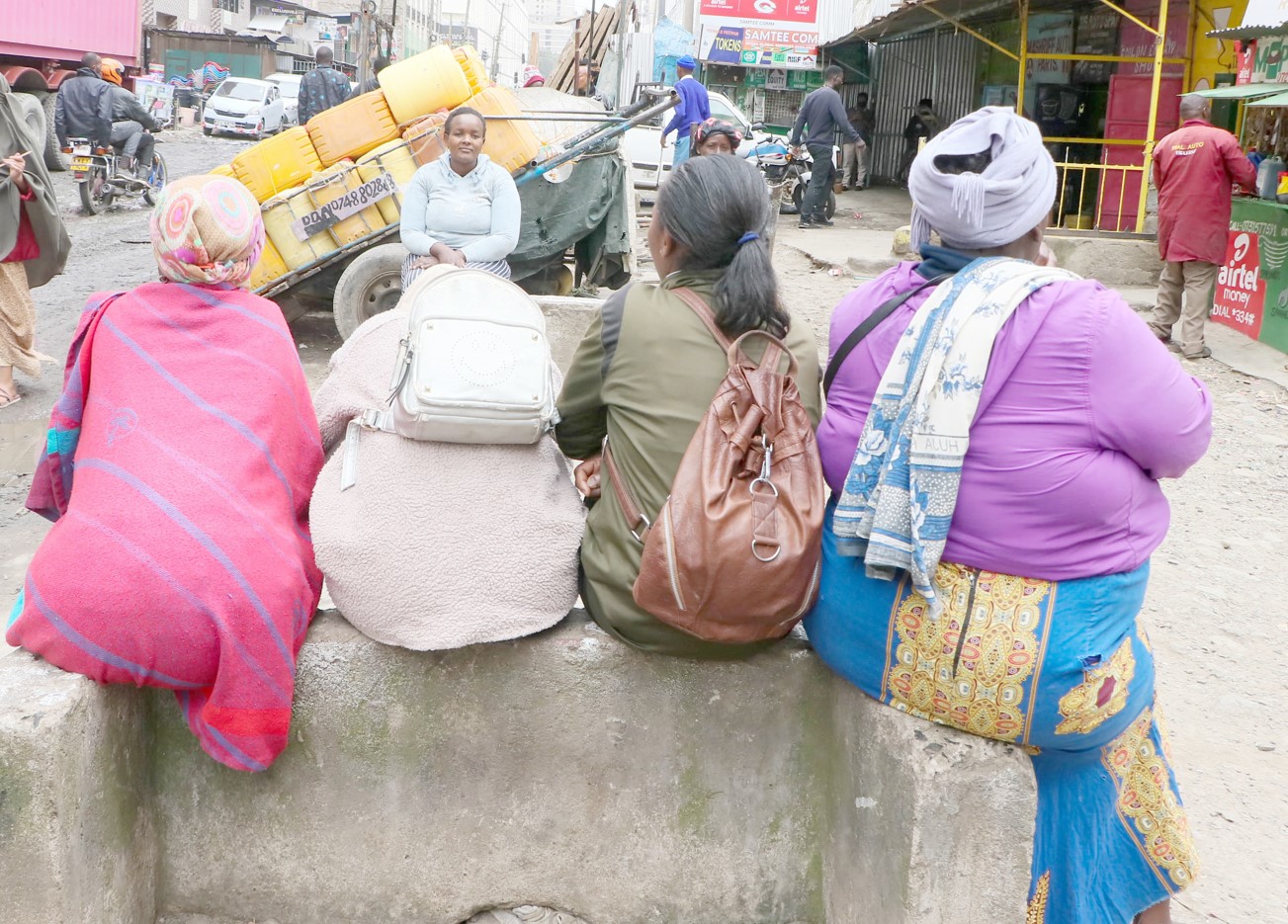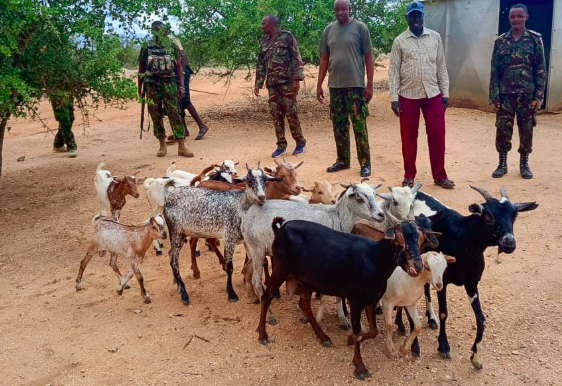Eastleigh's stones of hope where 'mama fuas' wait for their luck

Each day, approximately 60 women gather at the same spot, waiting for potential clients who might need their laundry and cleaning services.
Along the streets of Eastleigh in Nairobi, groups of women, both young and old, sit on stones, their faces showing a mix of hope and fatigue as they await the day's work.
These women, known as mama fuas or laundry service providers, come from various neighbourhoods such as Pipeline, Shauri Moyo, Kayole, and Mathare, and gather in Eastleigh in search of work to earn a living.
More To Read
- Eastleigh man transforms neglected 13th Street roundabout into flourishing maize farm
- Japanese Embassy officials tour Kamukunji, praise local innovation and enterprise
- Eastleigh traders urge City Hall to address street vendor clashes, poor roads, waste crisis
- Somalia Independence Day celebrations banned in Eastleigh over security fears
- Silent struggles: Kenyan men speak out on financial pressure, mental health, and masculinity
- 13 suspects arraigned over mugging in Eastleigh's Maries Stopes area
Among them is 35-year-old Eunice, a mother of two young children. Her journey from Shauri Moyo to Eastleigh is not just a commute but a work search which feeds her family.
Eunice, who has been working as a mama fua for three years now, spends her days waiting along Bercuba Street in Eastleigh for a call to service.
“I do this job for the sake of my children. Raising them is not easy — they need to eat, go to school, and have clothes. It's not that I'm uneducated; there just aren't enough jobs in Kenya. So with the little I get, it keeps me going every day,” Eunice says, exhaustion lingering in her eyes.
Each day, Eunice begins her work at 9 am and goes on until 4 pm. Among the services she offers include washing clothes, cooking, general house cleaning, ironing, and looking after children. She says she currently provides laundry services for a Canadian and an American residing in Eastleigh. On a good day, she earns Sh3,000, but on a bad day, her earnings can be as low as Sh200.
“Some days, the people I work for might not call me, so my only option is to wait here for someone else who might need my services. The challenge is that the pay is often very low, but since you can't turn down any money, you just have to take what comes,” she says.
Eunice is not alone in the laundry service industry.
Irene Akinyi, who hails from Pipeline, joins her fellow workers on the stones along Eastleigh’s Keroe Street, nestled between General Waruingi Street and Waudo Street.
Each day, approximately 60 women gather at the same spot, waiting for potential clients who might need their laundry and cleaning services.
However, the job is not without its difficulties. Akinyi notes that the influx of workers from countries like Uganda has intensified competition, causing a drop in the value of their work.
Akinyi explains that while she and her colleagues might ask to be paid Sh15,000 per month, the Ugandan workers offer their services for Sh7,000 per month, which the employers find cheaper.
This disparity means that on average, the women earn between Sh200 and Sh500 per day each.
“When these foreign workers accept such low rates, it deteriorates the job market. Employers often seek cheaper options, which makes the work even harder. Additionally, constantly being in water washing clothes also leads to frequent illnesses,” she says.
Besides the competition, the work they do is sometimes challenging.
“You might be asked to clean a four-bedroom house with up to ten people living in it. You end up washing all their clothes, sometimes cooking for them, and even washing the dishes. Why would you pay someone Sh200 or Sh300 for such work?” asks Beatrice Awuor, another worker.
According to Eunice, many of the foreign workers are young and without family responsibilities, which makes them more willing to accept any payment. Some also see the Kenyan currency as significantly stronger compared to their own, making lower wages more appealing to them.
But it is not always that they are lucky to get work to do.
“Sometimes we spend the entire day sitting on these stones, waiting for work, and end up with nothing. It's disheartening and makes the struggle harder,” says Taaka Maureen who lives in Kawangware.
For 40-year-old Ann Anyango, the relationship with her employer for whom she has worked for a year and a half has been good.
“My employer and I agreed that my salary would increase every few months. I started with a salary of Sh5,000 and am now being paid Sh8,000 monthly. This September, I’m also expecting a raise of Sh2,000. I’m satisfied with the payment since my duties are minimal — I only wash clothes. I report to work at 9 am and finish by 4 pm,” she says.
Despite the challenges, these women have made significant contributions to society by taking on essential roles in households.
“I hired a housekeeper because I’m always busy with work and can’t leave my three children alone at home. I truly appreciate how well she manages her tasks; she does her job efficiently and my children have grown very fond of her. Additionally, her services are quite affordable, as I pay her Sh1,500 a day, which is reasonable given the level of care and attention she provides,” said Mariam, a resident of Eastleigh.
Mama Halima, who also has employed a housekeeper, praised her for her exceptional services.
“My housekeeper does a great job, and I am very pleased with her work. I’ve had her for over a year now due to my demanding job of selling groceries. She has helped me and she takes great care in everything she does, from cleaning to cooking, and her attention to detail is remarkable,” she said.
Mama fuas have made their mark not only in Eastleigh but across Nairobi.
Recently, it emerged that a growing number of young Kenyan bachelors are seeking the assistance of women who offer cleaning services to manage their household responsibilities.
In today’s society, mama fuas do more than basic cleaning — they anticipate when supplies in the house will run out and are responsible for the purchases.
Many bachelors find this arrangement both convenient and reassuring. They also appreciate that a mama fua requires only an agreed-upon payment, unlike a romantic partner who might expect additional financial support without contributing to household chores like cleaning and cooking.
Kennedy Muchiri, a 27-year-old accountant, said his decision to hire a mama fua was a way of avoiding the stress of being in a relationship so that he could concentrate on his career.
“I decided to hire a mama fua because I wanted to focus on my career without the added stress of household chores. Before she came on board, I was constantly stressed about what to eat, what to wear, and dealing with dirty clothes and a messy house. Now, the convenience and efficiency she brings are unmatched. It’s a practical and cost-effective solution compared to the complications of relationships, where responsibilities and expectations can be quite challenging,” he said.
For 28-year-old James Wanyoike, hiring a mama fua has been a game-changer.
“With my busy work schedule, I needed someone who could handle the household chores efficiently. She not only keeps the place spotless but also manages the grocery shopping and meal planning. It’s a huge relief to know everything is taken care of,” Wanyoike said.
According to a survey by the Kenya National Bureau of Statistics, the Kenyan economy saw an addition of 848,100 new jobs in 2023, driven by accelerated economic growth, but struggled to create quality formal jobs amid a surge in university graduates.
The 2024 Economic Survey reveals that 720,900 of the new jobs were in the informal sector, highlighting ongoing difficulties in generating quality employment despite a high university enrolment of 579,200 students in 2023.
The survey also notes that new job creation increased from 816,600 in 2022, raising total employment to 19.99 million from 19.14 million. Informal sector jobs in 2023 made up 83.4 per cent of all jobs, up slightly from 83.3 per cent in 2022. Additionally, 4,300 new jobs were created through self-employment and unpaid family work.
Top Stories Today












































